What Sugar Substitute to Choose If You Decide to Remove Sugar From Your Diet
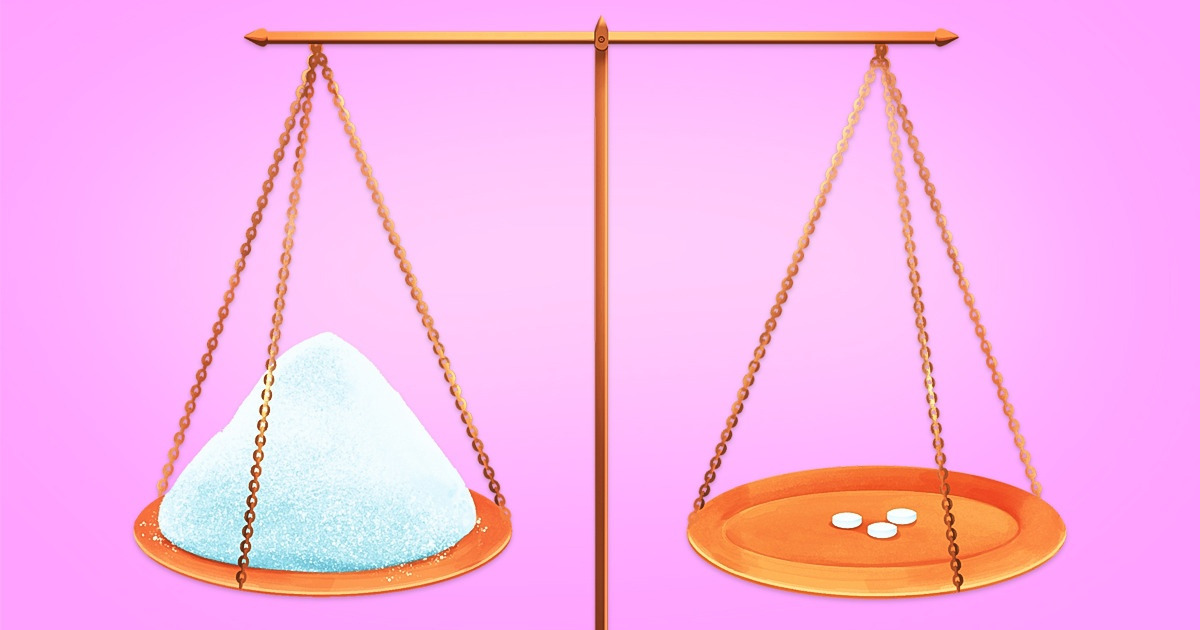
If you try to cut down on sugar in your diet, you’ve probably thought about artificial sweeteners and other sugar substitutes. Our article will help you make the right choice.
5-Minute Crafts would like to tell you about what a sugar substitute is, what types of sugar substitutes there are, what you should take into account when choosing one, and in what quantities it should be used.
What a sugar substitute is
A sugar substitute is a food additive that gives food a sweet taste, like that of sugar. Substitutes can be:
- Natural. These include products with a distinct sweet taste, such as honey, maple syrup, or fruit juices, and substances derived from the processing of fruits and plants, such as stevia and monkfruit leaf extracts. The former has calories, while the latter doesn’t.
- Artificial. These are synthetic sugar substitutes that are produced artificially or produced from natural substances (plants or sucrose). Artificial sweeteners are usually calorie-free.
- Sugar polyols. These are carbohydrates found in some fruits and vegetables. They contain calories, but less than sugar, making them a very attractive alternative.
What natural sugar substitutes there are
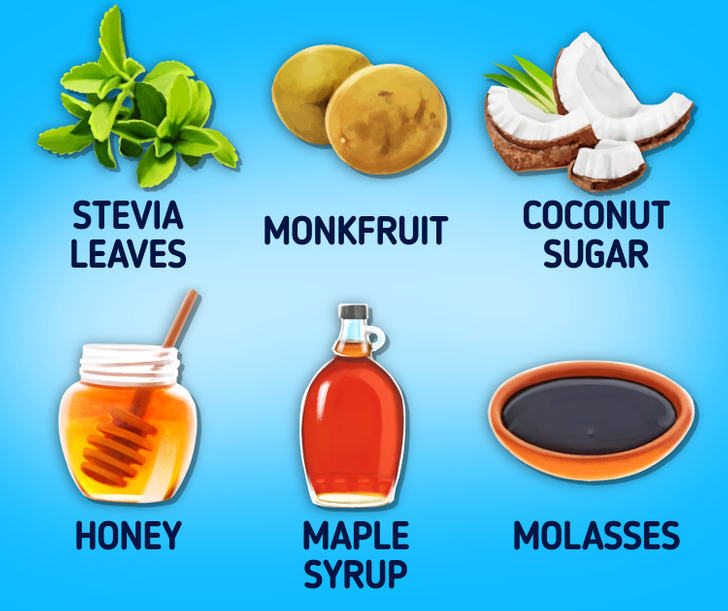
Among natural sugar substitutes you can find:
- Stevia leaf extract is a popular sweetener with a liquorice-like flavor and a bitter aftertaste. Because of the aftertaste, it’s often mixed with other sweeteners. It’s 200-400 times sweeter than sugar.
- Monkfruit extract is a sweetener derived from the juice of this Asian subtropical melon. It has a slight fruity taste, so it’s also often mixed with other sweeteners to make this flavor more subtle. It’s 100-250 times sweeter than sugar.
- Coconut sugar is a natural sugar made from the sap of coconut palms. During the production process, it’s less processed than white sugar and has a lower glycemic index. It’s a simple alternative to sugar.
- Honey is produced by bees from flower nectar or secretions (honeydew) of other insects by enzymatic activity and the evaporation of water. It may have a lower glycemic index or the same glycemic index as sugar, depending on the honey variety.
- Maple syrup is a sweet syrup made from the sap of the sugar maple or any other type of maple tree. It’s often used as an addition to pancakes or waffles, but it’s also a popular sugar substitute.
- Molasses is a dark, bittersweet liquid that remains after all the sugar has been removed from the raw cane. Because of its rich taste, it’s best to use molasses in small quantities.
Natural substitutes seem to be healthier than sugar, but in fact, their vitamin and mineral compositions don’t differ that much. For example, honey and sugar have similar nutritional benefits, and eating natural substitutes will generally not provide additional health benefits. Consuming too many sweeteners can lead to problems such as tooth decay and weight gain. Therefore, natural sugar substitutes in the diet should be limited in the same way as other types of sugar and consumed in moderation.
Guide to artificial sugar substitutes
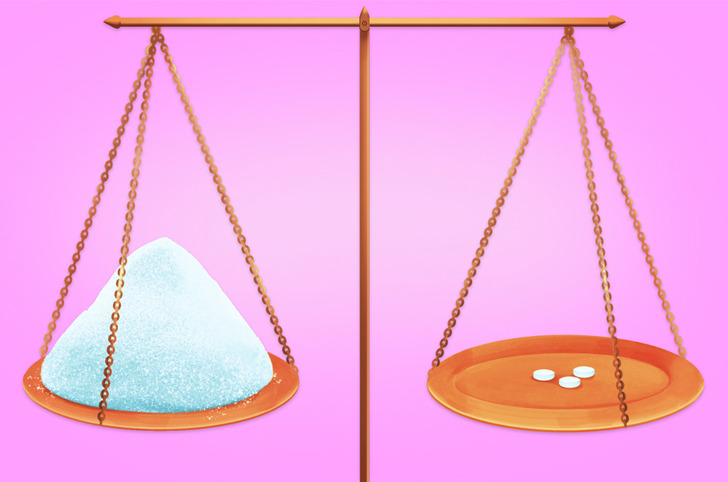
The most common artificial sugar substitutes are:
- Aspartame is one of the most common home use sweeteners and sugar substitutes. It’s often added to drinks, yogurt, candy, desserts, and chewing gum. It’s 200 times sweeter than sugar.
- Acesulfame (also known as acesulfame potassium) is a sugar substitute that has a bitter aftertaste and is often combined with other artificial sweeteners. It can be used in soft drinks, desserts, yogurt, candy, and chewing gum. It’s 200 times sweeter than sugar.
- Saccharin is another sweetener with a pronounced bitter aftertaste. Most often it’s added to jams and candy. It’s 200-700 times sweeter than sugar.
- Sucralose is made from regular sugar, therefore it has a “purer” sugar taste without impurities and bitterness. It’s used in the production of refined sugar substitutes, as well as salad dressings, microwave popcorn, and a variety of baked goods. It’s 600 times sweeter than sugar.
Artificial sweeteners are almost calorie-free, so they’re a good option for those who want to control their weight. In addition, they are carbohydrate-free and don’t raise blood sugar levels.
Don’t worry about the dangers of sugar substitutes. Numerous studies confirm that they are safe for your health. However, it’s important to consume them in moderation and not exceed the level of permissible daily intake, which is indicated on the product’s packaging.
A guide to sugar polyols
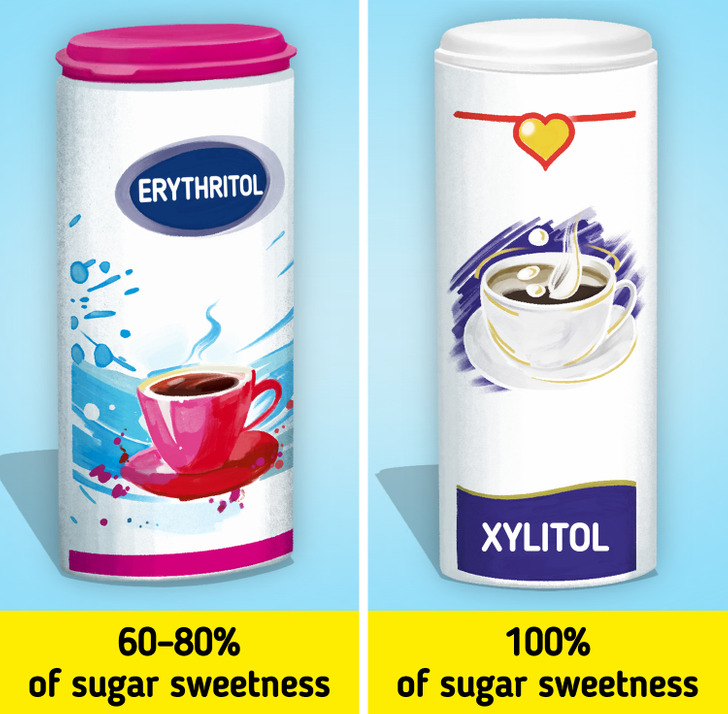
Among sugar polyols, the following sweeteners are popular:
- Erythritol is a sugar polyol that is similar in texture to refined sugar. It’s popular in home use, but also added to candy, cookies, and sugar-free gum. The sweetness of erythritol is 60 to 80% of the sweetness of sugar.
- Xylitol is similar to erythritol and is also often used in the production of sweets and at home, but in high doses it can have a laxative effect. Because of this, it’s recommended that you strictly adhere to the daily intake indicated on the packaging. Xylitol has the same sweetness as sugar.
Like artificial sweeteners, sugar polyols don’t cause tooth decay. And they also help control weight because of their lower calorie count.
What you should take into account when choosing a sugar substitute
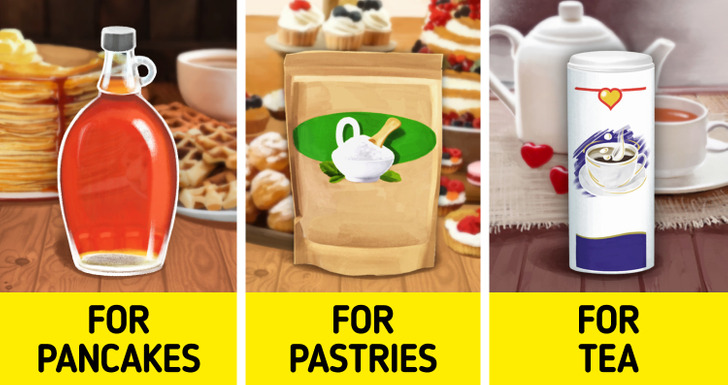
- Form. Sweeteners can be in the form of liquid, powder, or pastilles. The first one is convenient to use as an additive to various dishes (pancakes, waffles, cereals, and so on), the second one is good for baking, and the third one works as a sweetener for tea.
- Calorie content. Most natural sweeteners (especially honey, maple syrup, and molasses) are just as high in calories as sugar. If you want to control the calorie content of your diet, it’s better to opt for sugar polyols or artificial sweeteners.
- Glycemic index. If you monitor your blood sugar, it’s best to choose low glycemic sweeteners like artificial sweeteners.
- Taste. Some sweeteners (acesulfame, saccharin, and stevia) can have a bitter aftertaste, while others (maple syrup, honey, molasses,, and coconut sugar) have a bright unique taste. If a neutral flavor is important to you, consider sucralose.
In what quantities should a sugar substitute be used
The intensity of the sweet taste in sugar substitutes may be different from the sweetness of refined sugar — sometimes they’re sweeter, sometimes they’re less sweet.
- Natural sweeteners are usually equal to sugar, with the exception of stevia leaf extract and monkfruit extract. The first is 200-400 times sweeter than sugar, and the second one is 100-250 times sweeter.
- Artificial sweeteners. Most of them are many times sweeter than sugar, so you should add less of them than of refined sugar.
- Sugar polyols. Xylitol is as sweet as sugar, so it can be added to food or tea in the same amount as refined sugar. Erythritol is about 20-40% less sweet than sugar, so you may need more of it.
What sugar substitute do you prefer?